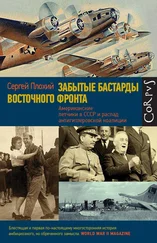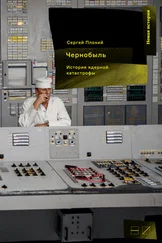Briukhanov’s apartment was on the fourth floor. It was his second home in Prypiat. The first was located farther down Lenin Boulevard in the first apartment building to be built in Prypiat, in 1971. Back then, he had needed permission from a party secretary in Kyiv to move in—so scarce was housing in the city during its first years of existence, and so careful was the party not to offend the working class by creating the impression that it favored managers over workers when it came to goods and privileges. The new town was supposed to be an embodiment of socialism, with no private cottages allowed. The planners projected that by 1975 it would house close to 12,000 plant and construction workers. By 1980, as the third and fourth reactors were to come onstream, the number of people dwelling in the city was expected to grow to 18,000; the population would then decline to slightly more than 17,000 and stay at about that level for the next five years. In fact Prypiat grew much faster, attaining a population of almost 50,000 by 1986. Housing remained a problem. 19
The leaders of the Komsomol—the Young Communist League, the youth branch of the Communist Party—had given the city of Prypiat and the Chernobyl power plant the status of a Komsomol construction site, recruiting young people all over the Soviet Union to join its workforce. But most of those who came to work in Prypiat needed no special encouragement. Problems with housing were common in Soviet cities, and in Prypiat housing was being built faster and better than anywhere else. The city enjoyed special status in the country and the republic with regard to supply of consumer goods and agricultural products because the nuclear industry was still very close to the military-industrial complex, with its special privileges.
By the mid-1980s, it had become impossible to buy cheese or sausage in most of the towns and big cities of the Soviet Union, but those products were freely available in Prypiat. The signs in the local supermarket did not lie in that regard. More difficult was the situation with fresh meat, which was often supplemented with lard and bones, but then, at least there were villages around the town where meat and milk could be bought. Life was relatively good in Prypiat, and many, especially from the neighboring villages, wanted to move there. Once in the city, often as construction workers, they all wanted to work at the nuclear plant, where bonuses could be earned for fulfilling and overfulfilling production quotas.
Most people who came to the new city were young, and many were unmarried. The average age of those living in Prypiat in 1986 was twenty-six. There were eighteen dormitories in the city for singles, and most apartments were designed for young families. Not only were most inhabitants young, but their children, when they had them, were young as well. In the five local elementary schools, there were as many as fifteen parallel classes, each with no fewer than thirty students. Most rural schools, by contrast, had barely enough students for one class. In most urban schools, there were only three parallel classes running at most. And there was no sign of this trend slowing: more than a thousand newborns were welcomed to the city every year. 20
There were two stadiums and two swimming pools, one of which qualified for international competitions. Briukhanov was proud of what he had helped to build in the city but also annoyed that he often had to divert funds and resources from the plant for construction projects in Prypiat. The city was run separately from the plant by the party and local authorities, but, as the city’s coffers were often empty, while the power plant had an enormous budget, the local party authorities kept importuning Briukhanov to chip in and build new facilities for the city. Briukhanov could keep the local party bosses at bay, but he could not say no to the party officials on the regional and republican levels—they outranked him in the party-state hierarchy. Especially pushy was the first secretary of the Kyiv regional party committee, Hryhorii Revenko, who would become Gorbachev’s chief of staff in 1991. In the mid-1980s, Revenko convinced Briukhanov to build the second swimming pool, which would meet international standards. Then he came up with plans for a skating rink. Briukhanov bristled at this: “There was nothing of that class in all of Ukraine, but I was supposed to build it in my little town?” he recalled later. Still, he went along with the request. 21
Briukhanov realized that his own workers needed sports facilities and would benefit from them. The same was true of the shops, as the architects had planned for only one supermarket. The city needed more, and Briukhanov found money for them, occasionally misleading the banks—he would borrow funds for the plant and spend them on the city. “We get used to the abnormal and begin to accept it as something like the norm. That is what’s so terrible!” he complained to a reporter a few months before the party congress in Moscow, referring to the need to take care of the city’s problems when his time and energy were needed at the plant—to ensure its safety, among other things. “In those second-rate circumstances, the main thing is to ensure the reliability and safety of our work,” said Briukhanov, continuing his litany of complaints. “Whatever you say, we are no ordinary enterprise. God forbid that we suffer any serious mishap—I’m afraid that not only Ukraine but the Union as a whole would not be able to deal with such a disaster.” 22
But for now, Briukhanov could put such disturbing thoughts aside. He was finally home. International Women’s Day lay ahead, a chance to greet his wife and spend time with friends and colleagues. His daughter no longer lived with them: she and her husband were about to graduate from medical school in Kyiv. The Briukhanovs would have to greet her over the phone, but they soon hoped to host the young couple in Prypiat. They were expecting a child, and Briukhanov would become a grandfather. He had worked hard for everything that he had achieved in life, but he had to admit that life was treating him pretty well. The year 1986 seemed to be off to a particularly good start. First, there was his participation in the party congress in Moscow. Then there were rumors that he was poised to be awarded the Star of Hero of Socialist Labor. Of course, it would mean fulfilling and overfulfilling his production quotas, but that was nothing new—he had done it before. 23
On the morning of the next day, March 8, the main regional newspaper published a photo of a smiling Briukhanov surrounded by other delegates to the congress upon their return to Kyiv. He looked reserved, perhaps a little tired, but generally happy and satisfied—a man in control of his destiny and that of the people around him. 24
3
Power Plant
International Women’s Day notwithstanding, the single biggest event scheduled for Viktor Briukhanov and his colleagues and subordinates for the month of March 1986 was an all-Union conference of representatives of enterprises that supplied construction materials and hardware for the Chernobyl nuclear plant. The three-day conference, planned for the last week of the month, was intended mainly to coordinate the actions of the plant administrators, the construction directorate, and the vendors and solve problems that had emerged with the construction of the newest power unit of the plant, reactor No. 5. Construction quotas for 1985 had not been met, and the prospects for bringing the reactor onstream in 1986 were dubious, but the Moscow party congress had set a goal of more than doubling the construction of nuclear units in the course of the next five-year plan. 1
In Prypiat, the person with the greatest stake in the success of the conference was Vasyl Kyzyma, the fifty-four-year-old head of the construction directorate that was charged with building the power plant. As far as power and prestige went in the city of Prypiat, Kyzyma outshone Briukhanov. Whereas the latter lived in an apartment building, though a prestigious one, Kyzyma and his family occupied one of four cottages built in a city that was supposed to have no cottages at all. When the Ukrainian party boss, Volodymyr Shcherbytsky, visited the site of the power plant in the mid-1970s, he was so impressed with the young director of construction that he ordered his aides to ensure Kyzyma’s election to the Ukrainian Supreme Soviet. That would not only raise Kyzyma’s salary but also boost his prestige and independence from local party and state officials. In 1984 Kyzyma was given the highest Soviet award—Hero of Socialist Labor. Briukhanov, despite being elected a delegate to the party congress in Moscow, was still waiting for that kind of recognition. 2
Читать дальше
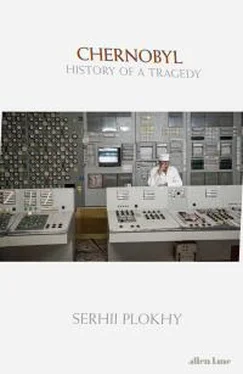

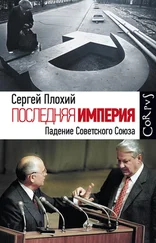



![Сергей Плохий - Чернобыль - История ядерной катастрофы [litres]](/books/385171/sergej-plohij-chernobyl-istoriya-yadernoj-katastrof-thumb.webp)
![Сергей Плохий - Человек, стрелявший ядом [История одного шпиона времен холодной войны]](/books/405163/sergej-plohij-chelovek-strelyavshij-yadom-istoriya-od-thumb.webp)

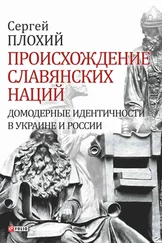
![Сергей Плохий - Потерянное царство. Поход за имперским идеалом и сотворение русской нации [c 1470 года до наших дней]](/books/433093/sergej-plohij-poteryannoe-carstvo-pohod-za-impersk-thumb.webp)
